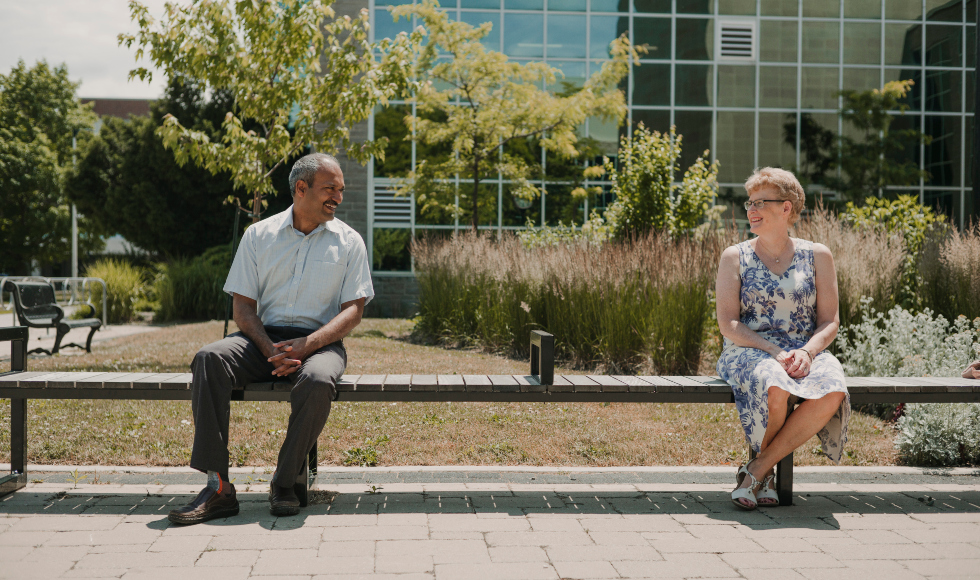McMaster opens Centre of Excellence to advance personal protective equipment in Canada

Ravi Selvaganapathy (left) and Alison Fox-Robichaud. Photo by Jin Lee
BY Jessie Park, Faculty of Engineering
July 6, 2020
McMaster University is now home to an established network of engineers, clinicians, local manufacturers and companies dedicated to advancing personal protective equipment products in Canada.
The newly opened Centre of Excellence in Protective Equipment and Materials (CEPEM) aims to create an ecosystem of local expertise to build domestic supply chains for PPE and innovate existing products, including face masks and shields.
“We established the Centre to be a hub of companies interested in this area, enable a research and development program and translate those findings into products that Canadian industry would put out into the world,” says Ravi Selvaganapathy, CEPEM’s director and a professor of mechanical engineering and biomedical engineering.
The team will focus on six areas of activity: designing and developing PPE, advanced manufacturing, research in functional materials, testing and validation, creating Canadian standards for PPE, and making PPE more sustainable for the environment.
The need for local solutions to challenges around PPE, Selvanagapathy explains, was made clear through conversations with Hamilton Health Sciences (HHS) early in the COVID-19 pandemic.
“With the declaration of the pandemic and the shutdown in China, our supply chain [for PPE] was interrupted,” says Dr. Alison Fox-Robichaud, a critical care physician at HHS and a professor in the Department of Medicine at McMaster.
“There was a point where – with some of the masks that we would normally wear – we had less than a week supply. If we had any more cases coming or the supply chain had totally broken down, we would not have been able to do our usual care with a mask.”
The team of engineers promptly looked at their own manufacturing capabilities to create an emergency back-up supply of masks and face shields. They quickly realized the magnitude of the long-term challenge required more hands-on deck, and that there were extremely scarce resources available in North America for testing the effectiveness of PPE.
“That’s when it became a bigger effort,” says Selvaganapathy. “We identified that building a good testing setup is crucial, and once we had capability, we then became a resource centre for local companies who were eager to see Canadian testing for these masks.”
Since March, more than 50 companies have worked with McMaster to set up production facilities, test PPE designs or modify materials needed to make new designs.
Two of these companies, Whitebird and Niko Apparel, are now producing about 65,000 face shields and 20,000 face masks each day for healthcare workers, respectively.
“The speed at which we have been innovating for the past three months has been incredible,” says Dr. Fox-Robichaud, who gave the engineering team personal feedback on the comfort and usability of dozens of mask designs.
“This Centre of Excellence would not exist without the collaboration and support from countless faculty and community members, including the Canadian Centre for Electron Microscopy (CCEM) at McMaster,” says John Preston, associate dean of research and external relations in the Faculty of Engineering.
The CCEM provides world-class electron microscopy capabilities and expertise to Canadian researchers and is funded by the Canadian Foundation for Innovation (CFI), which Preston says is instrumental in the university’s efforts in advancing PPE.
This collaboration continues to lead to new opportunities beyond McMaster, including numerous grants awarded to Faculty of Engineering members from agencies like the Natural Sciences and Engineering Research Council of Canada (NSERC) and the Canadian Institutes of Health Research (CIHR).
Beyond healthcare applications, the Centre is looking ahead to needs in other industries where PPE is required, including mining in petroleum industries and firefighting.
“We went in not knowing much about masks and face shields, but we found very interesting problems that we could improve,” says Selvaganapathy.
“This is an industry that is worth disrupting – there is a lot of innovation that could be brought in.”
To listen to an in-depth conversation with Ravi Selvaganapathy, Dr. Alison Fox-Robichaud and John Preston, check out the first episode of Big Ideas for a Changing World, a research podcast from the Faculty of Engineering.


